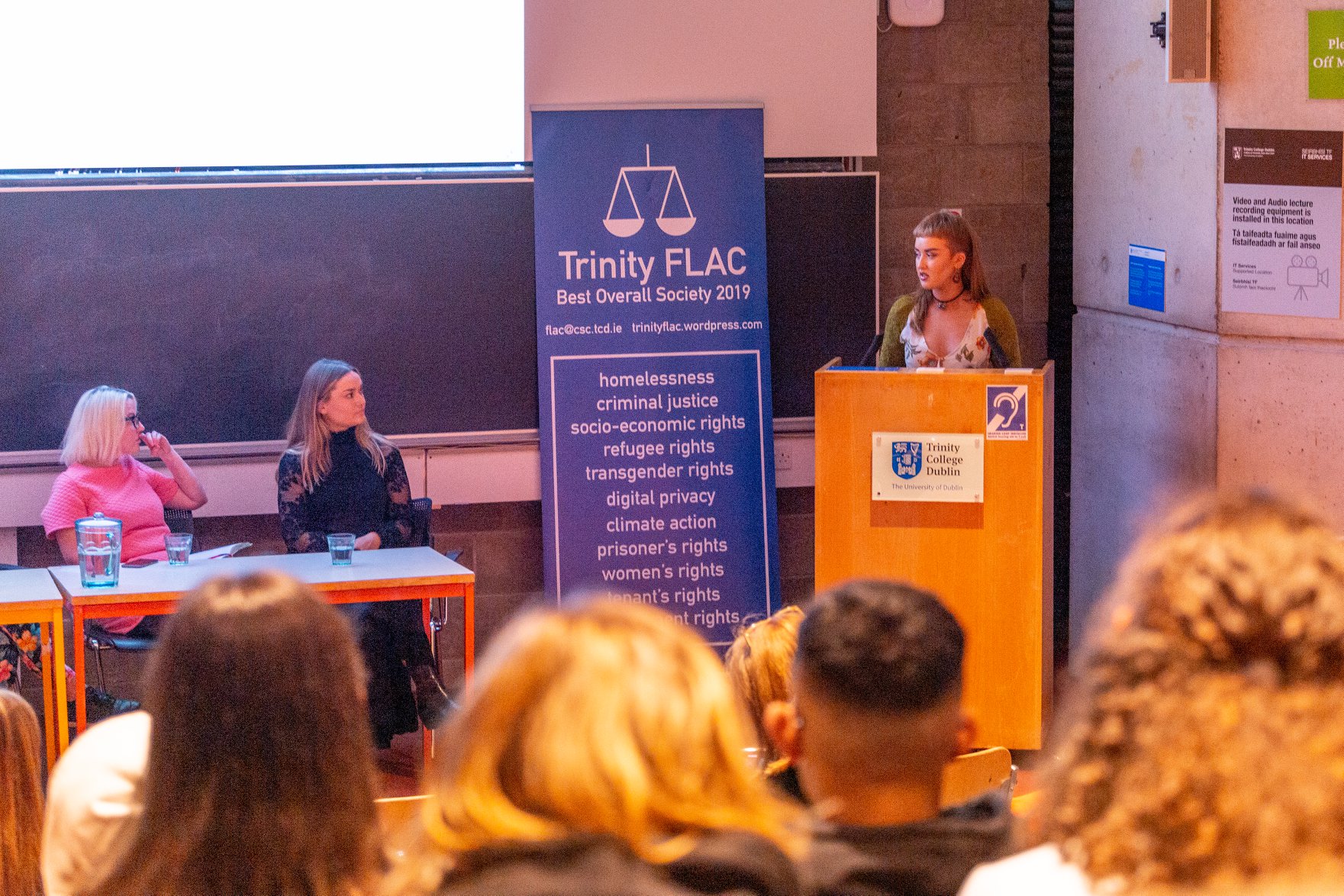The climate crisis is the defining problem of our generation. It encompasses everything we do and every choice we make, from how we travel to what we eat. On Tuesday, Trinity’s Free Legal Advice Centre welcomed four guest speakers to discuss the issue from the perspective of what we wear.
The speakers each approached the issue from their own unique perspective. The first speaker was Rachel Maguire, a final year fashion design student who has been avoiding fast fashion for the past decade, primarily using old fabrics such as curtains and duvets to “make waste look beautiful”. She began her talk by drawing attention to the manipulative force of the fast fashion industry, asking how often it felt that our wardrobes were “out of trend” or if we could say where we bought our clothes and for how much. She pointed out that the fashion industry preys on our insecurities and tries to force assimilation, saying “We are all so different, yet we dress the same.” She elaborated that the fashion industry spends a pittance on clothes by cutting corners on materials, labour, and the environment, instead focusing on marketing.
It was at this point that she laid down the hard facts. The fashion industry is the second biggest emitter of greenhouse gases, after the oil industry. It leads to 20% of all water contamination. 65% of our clothes are made from plastics and washing these releases microplastics, which are the biggest contributor to plastics in our oceans.
She ended her talk with three suggestions on how we can reduce our waste in regards to fast fashion. Firstly, buy vintage or second-hand clothing. Secondly, if you must buy new clothes, buy from local boutiques instead. Thirdly, try to not throw things out; keeping an item of clothing for nine months longer reduces its carbon footprint by 30%.
The next speaker was Clodagh Evelyn, host of Climate Queens podcast and founder of Swapsies, a clothes swapping community. She furthered Maguire’s points about the pollution of the fashion industry, noting that one garbage truck full of clothes is sent to a landfill or burned every single second. Beyond that, she explained that to make one t-shirt it takes 2,700 litres of water – the average drinking water of a person over three years – since cotton requires extensive irrigation to grow properly. She also introduced the human rights problems that are at the heart of many fashion brands, drawing attention to the fact that CEOs of top fashion chains earn in four days what a garment worker makes over the course of their entire life. She urged the audience to demand traceability and further transparency in the industry, as well as taking care of your clothes.
The clear human rights violations perpetrated by many brands is a topic that was picked up by the next speaker, Carrie Ann Moran, the sustainability manager at NCBI and country coordinator of Fashion Revolution. She explained that her undergraduate degree was in law and she studied fashion design later in life. Through a combination of both degrees she realised that the fashion industry was “horrendous” in terms of human rights abuses: “29 million people are trapped in modern day slavery as a result of the fashion industry.” This is what led to her involvement with Fashion Revolution, a movement that seeks to create a fashion industry that cares about people, creativity, the environment and profit in equal measure. Much of her work, as she explained, is centred on reducing the amount of waste in the design stages of product manufacturing. She elaborated that 10% of all textile waste comes from poor designs that leave things on the cutting room floor. Beyond that, if the correct work is done at the design stage, it can increase the lifespan of a product by up to 90%. She elaborated that the advent of fast fashion is a relatively new one: “We are not reinventing the wheel. We are going back.” She finished by saying that “Clothing isn’t going anywhere, we just need to make it better.”
The final speaker was Megan Fox, the fashion editor of Stellar Magazine. She spoke about the shops and initiatives in Dublin that are worth supporting in the campaign against fast fashion. She listed shops such as Betty Bojangles, Siopaella and Borrower Boutique. She expressed that as someone who aims to tell a story through clothing, charity shops are invaluable because “You come across so many hidden gems.” She urged us to really question why we are buying what we are buying. She ended by emphasising the necessity for further transparency in the industry, bringing attention to the concept of Greenwashing. This is a recent development in fast fashion, where brands release an eco-range of clothing (usually centred on the use of recycled materials), but this ignores so many of the other issues, such as microplastics, the emissions released in the production, the rights of workers and so on. Vigilance and transparency are vital in the fight against fast fashion.
With all this talk about corporate behemoths and the destruction of ecosystems, it can feel overwhelming and discouraging, yet throughout, every speaker insisted that the only useful response to these problems is hope. Fox insisted that we should look at all the hope in the room, while Maguire asserted that “All we have is our individual power”. Evelyn highlighted the importance of contacting government officials to introduce stricter policy changes. To finish, Moran said “Take this information. Share it with somebody. Don’t keep this to yourself.”






